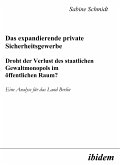The legitimate use of force is generally presumed to be the realm of the state. However, the flourishing role of the private sector in security over the last twenty years has brought this into question. In this book Deborah Avant examines the privatization of security and its impact on the control of force. She describes the growth of private security companies, explains how the industry works, and describes its range of customers - including states, non-government organisations and commercial transnational corporations. She charts the inevitable trade-offs that the market for force imposes on the states, firms and people wishing to control it, suggests a new way to think about the control of force, and offers a model of institutional analysis that draws on both economic and sociological reasoning. The book contains case studies drawn from the US and Europe as well as Africa and the Middle East.
Dieser Download kann aus rechtlichen Gründen nur mit Rechnungsadresse in A, B, BG, CY, CZ, D, DK, EW, E, FIN, F, GR, HR, H, IRL, I, LT, L, LR, M, NL, PL, P, R, S, SLO, SK ausgeliefert werden.









